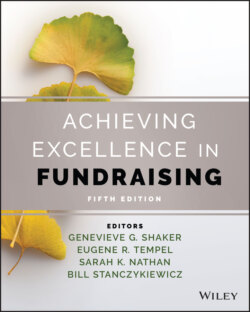Читать книгу Achieving Excellence in Fundraising - Группа авторов - Страница 80
Gift Substantiation and Disclosure
ОглавлениеA donor cannot claim a tax deduction for any single contribution of $250 or more unless the donor obtains a contemporaneous, written acknowledgment of the contribution. An organization can assist a donor by providing a timely, written statement containing the following information:
Name of organization.
Date of contribution.
Amount of cash contribution.
Description (but not the value) of noncash contribution.
Statement that no goods or services were provided by the organization in return for the contribution, if that was the case.
Description and good faith estimate of the value of goods or services, if any, that an organization provided in return for the contribution.
Statement that goods or services, if any, that an organization provided in return for the contribution consisted entirely of intangible religious benefits, if that was the case.
For the written acknowledgment to be considered contemporaneous with the contribution, a donor must receive the acknowledgment by the earlier of the date on which the donor files their individual federal income tax return for the year of the contribution or the due date (including extensions) of the return. The acknowledgment must describe goods or services an organization provides in exchange for a contribution of $75 or more. For a summary of the gift receipt rules, see IRS Publication 1771, Charitable Contributions – Substantiation and Disclosure Requirements.
